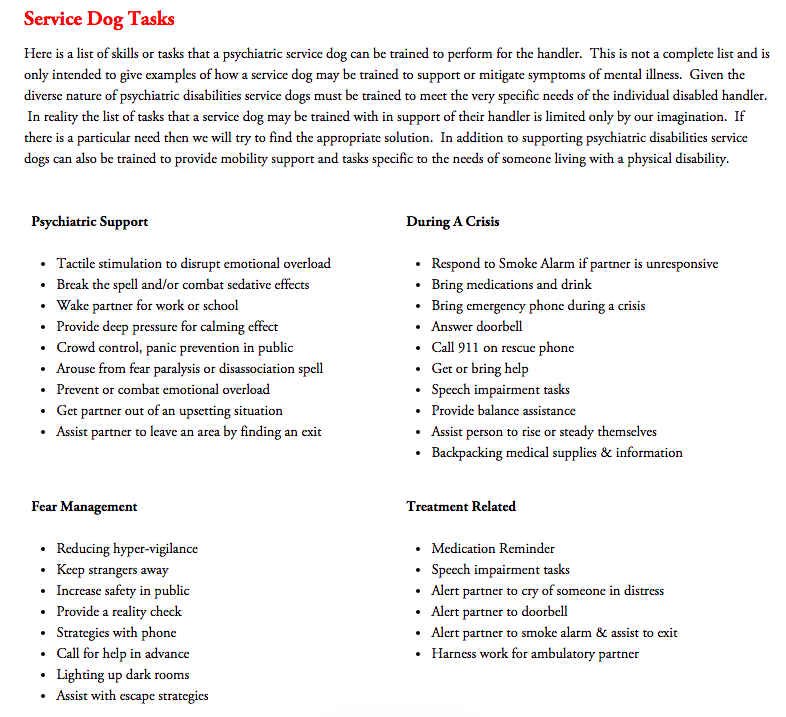Since my last post, I have been getting a lot of feedback; mostly positive (thank you) and some negative. I would like to clarify a few things regarding Emotional Support Animals vs Service Dogs. I should have probably put this as a disclaimer on my last post, but here it is: I am NOT an expert in service dogs and the laws surrounding them. I simply know what my experiences have been, both as a person with an ESA and as a person with mental illness. Since my last post, however, I have been doing a lot of research as a result of some of the feedback I’ve received, so here it goes:
- I live in Canada. A lot of people have been messaging me about the laws in the USA and my spreading misinformation regarding them. I do not know the laws there, or how they differ from here.
- As best as I can tell, the main difference between an ESA and a service dog is (this is going to sound obvious) that a service dog performs a service. However, this does not have to be a service for a physical disability. Obviously the stigma surrounding mental illness is a hot topic for me, so please remember that a dog can be a psychiatric service dog vs a guide dog or the like.
- The laws surrounding Service Dogs in general and Service Dogs vs ESAs are quite vague. I do think in a sense this could be a good thing, because a lot of people with mental health struggles are not up for big trips to the doctors and tests and paperwork. Unfortunately, it also does me that some people take advantage of the system. Could there/should there be a better way of managing the regulations? Probably, yes. Do I know exactly what that should be? No.
- As far as I can find, there is no regulating body or test to tell the difference between an ESA and a Service Dog. So while I refer to Athena as an ESA, she may well qualify as a Service Dog, given that she does perform services (ie. tactile stimulation to disrupt emotional overload, calming, provide reality check, reduce hyper-vigilance, etc.). I have my doctor’s note stating that I benefit from a Service Dog for my health. I do not know that there is a regulating body beyond that, and it is surprisingly difficult to find information on it. If anyone knows more about this, I’d be thrilled to hear it.
- Regarding the use of IDs (for example, I talked about the Official Service Dog Registry in my previous post), they are not mandatory. Some people have gone so far as to call them scams. I do not know exactly where the truth lies, but I will say that for the general public who are not very well versed on the laws surrounding Service Dogs (and who can blame them? It’s murky and confusing!) it simplifies things to have ID, so I like having it for that. It just keeps things simple.

The law surrounding ESAs is quite vague though and anyone challenging a dispute may have their work cut out for them.
As is the case with our service dogs we recommend that applicants must have a support network in place, that they be in active treatment for their condition with a doctor or psychiatrist, and that they are in possession of a signed letter from their doctor indicating the individual’s medical need for an ESA. – Canadian Service Dog Foundation
So, there you have it. As confused as ever? Yeah, me too. Bottom line: do not take advantage of the system, but also don’t assume that others are just because their disability isn’t physical. And please, do your own research before making any decisions regarding your dog’s role; I am speaking only to my experiences.

Verena, thank you such a great article once again. For me personally Roller has been a God sent. He helps me with keeping me calm outside. I stop breathing 3 times a hour and he either licks my forehead or steps on me to wake me up. I am not at the point of needing a machine till it reaches 5 times per hour. There is other things but I do not want to put them. You are doing a great job and you should be very proud of yourself.